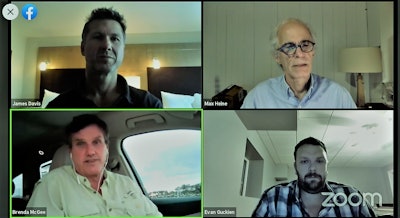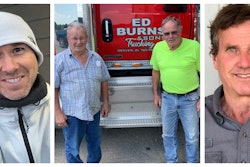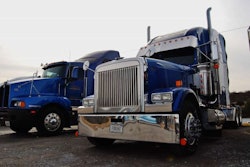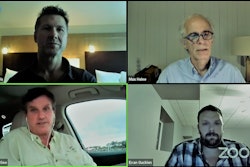Drivers might take a look at a successful owner-operator and make the wrong assumptions about his or her apparent success. “They see a relaxed schedule,” perhaps — “he’s making money, with a new pickup,” said James Davis, whose JDT Trucking was named the inaugural Overdrive Small Fleet Champ.
That owner-operator doesn’t have it as easy as it might seem, Davis added, let alone an owner of a fleet that employs 22 drivers like his own. Davis, of Central Point, Oregon, was responding to a question delivered as part of an interview conducted with all three finalists in the run-up to the unveiling of the winner. The three — including John McGee Trucking of Simsboro, Louisiana, and Evan Guckien, Indiana-based Ed Burns & Sons operations manager — revealed keys to their success they felt could serve as foundational for any owner-operator moving beyond that single truck.
 Oregon-headquartered James Davis, in a screen-grab from the live-feed portion of last night’s broadcast of the panel discussion with all of the finalists. You can watch it in full at the bottom of this post.
Oregon-headquartered James Davis, in a screen-grab from the live-feed portion of last night’s broadcast of the panel discussion with all of the finalists. You can watch it in full at the bottom of this post.For Davis, an acknowledgment of the importance of “hard work, dedication and time” is necessary. All three have underpinned his platform-freight-hauling fleet’s nine-fold growth in the last decade or so, and key to his first decade in business as an owner-operator, too. Along the way with growth, “I’ve learned to delegate as the size gets bigger,” he said. “If you pick a good supporting cast and your team stays driven,” growth will come.

That ability to delegate, making decisions on staff and so much more, can be hard to master for some owner-operators, well-habituated to doing all the hard work themselves.
It’s not all fun and games in the delegation business for small-fleet owners, as all three of the finalists have found, holding implications for recruiting and hiring, cash flow and debt management, customer service and more.
Davis reached something of a breaking point in his fleet’s growth in 2013.
“I had five trucks and three owner-operators” hauling full-time for him, he said. “I was trying to do everything on my own. I was still driving as well. There were definitely not a lot of good rest periods in there. That was my biggest hump to get over.”
That same year, though, he made a decision and “went ahead and opened an office and hired two people inside to dispatch, and hired a mechanic. We started growing again, and it got a lot easier then.”
Oil-field services tank hauler John McGee of Simsboro, Louisiana, whose fleet more than quadrupled in size over last decade to 16 trucks, learned the delegation lesson the hard way, too. Up to just two years ago, McGee still did not have a full-time mechanic among his staff, he said. Before then, he was that mechanic, also “dispatcher and relief driver. You do have to learn to delegate” to avoid running yourself ragged and thus sacrificing service quality in the long run, he said.
He built a shop that also has served as a headquarters in recent years. Before that, “everything we did was out of the house,” he said. At two-three trucks, with McGee operating one full-time, that was manageable. When it got to seven trucks, “there was always a truck at the house” with an issue McGee had to attend to. “And in our neighborhood, that wasn’t very well received,” he said, so they found property within 25 miles of most of their oil-field customers.
“We built a wash bay” with a reclamation system for the wash water, he added. It includes a two-bay shop and a two-level office with parts storage. “The benefit was it gave us the opportunity to hire a mechanic – we now do 95 percent of everything but warranty work in-house. When you get rid of paying a shop $100-plus an hour, that really offsets the cost of the shop on that side.”
Customers, too, now had a place at which to visit with the company, an important element for a small fleet to grow.
 McGee (bottom left) probably deserves the “above-and-beyond award” in the 2020 Small Fleet Champ discussion, said Max Heine (top right) in his introduction to the live Q&A portion of last night’s panel discussion. Simsboro, Louisiana, had been the literal eye of the Hurricane Laura storm in North Central Louisiana earlier in the day and power had been knocked out at both McGee’s home and shop. His wife and business partner, Brenda, had her laptop charged in preparation and the pair found a spot with a good cell signal in town to do the broadcast from their car.
McGee (bottom left) probably deserves the “above-and-beyond award” in the 2020 Small Fleet Champ discussion, said Max Heine (top right) in his introduction to the live Q&A portion of last night’s panel discussion. Simsboro, Louisiana, had been the literal eye of the Hurricane Laura storm in North Central Louisiana earlier in the day and power had been knocked out at both McGee’s home and shop. His wife and business partner, Brenda, had her laptop charged in preparation and the pair found a spot with a good cell signal in town to do the broadcast from their car.For Evan Guckien (pictured above, bottom right), longtime operations manager with 13-truck Indiana-based Ed Burns & Sons (a fleet with a 75-year legacy, the most long-lived among the finalists), his thoughts about just what to pass on to aspiring small fleet owners echoed those of former owner-operator Gary Buchs in Tuesday night’s second Partners in Business seminar, of a fashion. Buchs spoke of bedrock principles of customer service. As Guckien put it: “Keep your word. If the customer says they need it at 8 a.m., we get it there at 7:55. It’s been our experience that customers will pay a premium for top-level service, and that’s what we strive to provide.”
McGee echoed that sentiment. “I stand firm in my belief that the Golden Rule will prevail every time,” he said. “It’s about how you treat people, whether they’re your customers, they’re your employees, or your vendors. There’s not any room in the industry, in my opinion, for anything other than honest, safe and reliable transportation.”
As McGee hinted at: Just as important as creating value for the customer is doing the same for the driver. It was a nut that he didn’t fully crack until he’d made mistakes assuming his instincts were always going to be correct when it came to hiring decisions early on in his expansion from one truck.
He said his biggest mistake — and opportunity for successful adjustment, ultimately — was making the incorrect assumption that “somebody else will take care of your business the way you will. Hiring people you thought were going to do what they said they were going to do.”
He’d hired three drivers to that point, all of them stellar operators. Seven or eight failed hires later, attempting to find the right driver for a purchased truck — with one driver going so far as to abandon the unit by the side of the road — he made the call to “raise the bar and decided to find the driver before we bought the truck for him.”
It helped, too, that McGee had moved his pay package to an hourly basis, with overtime available above 40 hours, a key element in attracting what he believes are some of the best in the business, a sentiment echoed about the drivers by the owners of all three of the finalist fleets.
They all, too, undergird their pay packages with generous benefits. That includes 401(k) programs with some employer matching, a variety of bonus structures, health insurance and more. Benefits are key if you want to attract drivers and keep them around, said Guckien of Ed Burns & Sons. The cost of all that, of course, has to be “reflected in your rates and everything” you do around making it happen,” he said.
Guckien, too, emphasized the importance of individualized handling of employee drivers, a steep curve for him in his early days with the company. “Each driver needs coaching in different areas,” he said. “They all have different personalities and deal with anger in different ways, and have different priorities. It’s trying to fit their work to their personalities.”
Old top-down models like “forced dispatch,” he said, “would never work today.”
Ultimately, on the road to growth and success as an owner, emphasized Small Fleet Champ James Davis, don’t forget about that hard work that got you to where you are. Keep a close eye on the things that matter to owner-operators of any size fleet — like knowing the reality of your financial position, costs, revenue, profit, debt load and everything else.
About a year and a half ago, Davis said, “I got real comfortable having a great staff, and everything seemed to be going well.” Yet: “I wasn’t watching the numbers as I should. We didn’t get in trouble,” but just as he had, some of his staff had been “getting relaxed inside the office. Money was going where it shouldn’t have been.”
He calls his own lack of managing in that instance his biggest career mistake. The key outcome, however, involved learning from his mistake, something all owners can do. “It brought me back stronger,” he said.
Read more about each fleet in the Small Fleet Champ profile links that follow the full panel discussion video below.









